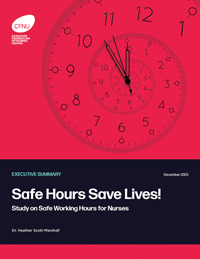 Safe Hours Save Lives
Safe Hours Save Lives

Long shifts and a shortage of staff are putting patients and health-care workers at risk across the country, according to the Canadian Federation of Nurses Unions’ recent Safe Hours Save Lives! report.
The report, released on Jan. 19, uses research compiled from in-depth reviews of already existing scientific studies on the consequences of occupational fatigue and excessive work hours. It’s also an environmental scan of work hours and scheduling policies and practices. The report uses interviews with nurses and the staff of colleges, unions and academic institutes to produce evidence-based findings on the impact of overworked health-care workers in Canada.
Unlike other industries, such as aviation and transport, nurses do not have regulations governing the number of hours they can work in a day or a week. This, combined with staffing shortages, leads to well-known safety risks now being passed on to those receiving health-care. “Federal, provincial and territorial governments must establish legislation and regulatory limits on consecutive work hours for nurses, mirroring the safeguards already in place for other safety sensitive industries,” says CFNU President Linda Silas.
“Pilots, for example, have regulations in place stating their maximum duty period is 13 hours. A plane is rightly delayed in the event this threshold is breached. The safety of passengers matters. So should the safety of patients.”
“We will not stop advocating for regulations in support of CFNU’s recommendations.”
- BCNU President Adriane Gear
Results from the study clearly show that exhaustion has a negative effect on nurses, patients and safety in the workplace. The study looked at how occupational fatigue due to excess hours increased the risk of safety incidents, the risk of workplace conflicts and lateral violence among colleagues, and the risks posed to overall health and well-being.
CFNU also conducted numerous interviews with key informants, including nurses actively working in health-care settings. Findings from those interviews highlighted serious safety risks and the impact of the ongoing staffing crisis, which was amplified during COVID-19.
Interviews also revealed the danger not only to patients under the care of nurses working 16-hour shifts or more, but also the risk to nurses themselves.
“You’re working with all these meds, and yet you can’t even drive yourself home ….” said an RN working in community health nursing. “That post-shift period of drowsy driving, the increase of risk of accident is something like tenfold; I mean it’s absolutely crazy, especially if you have been working nights and you don’t even know if your car is moving toward the middle of the road. Some of us turn up the radio and roll down the windows, but I still always tell myself it’s the grace of God sometimes, because you’re physically so compromised.”
Recommendations that emerged from the report include the enacting of new legislation and regulations on safe hours of continuous work, shaping the language in collective agreements regarding employers’ obligation to ensure safe work hours, conducting effective interventions for fatigue management, supporting nurses in escalating concerns around safe hours of work in a timely manner and ensuring nurses do not lose their licence if leaving the workplace due to unsafe hours of work.
BCNU continues to advocate for safe working hours in line with recommendations coming out of CFNU’s report, with the inclusion of new language in the current NBA collective agreement to help protect and limit shift hours and by lobbying the provincial government to make BC the first province in Canada to enact minimum nurse-to-patient ratios.
“The safety and well-being of our members is our main priority, and the results of this report show that it is more important now than ever,” says BCNU President Adriane Gear.
“Our success toward establishing minimum nurse-to-patient ratios is a major step in the direction of protecting nurses from being overworked, but we know there is more that needs to be done and will not stop advocating for regulations in support of CFNU’s recommendations.” •
To read the full report and find out more about CFNU’s Safe Hours Save Lives! campaign, visit nursesunions.ca.
UPDATE (Spring 2024)

Safe Hours Save Lives! delivers a critical examination of escalating burnout among Canadian nurses due to excessive work hours, and underscores the dramatic increase in overtime and its impact on nurse well-being and patient safety. The report advocates for mandated safe hours of work regulations, robust fatigue management strategies and supportive work environments, paralleling safety measures in other industries, to protect both nurses and their patients.

